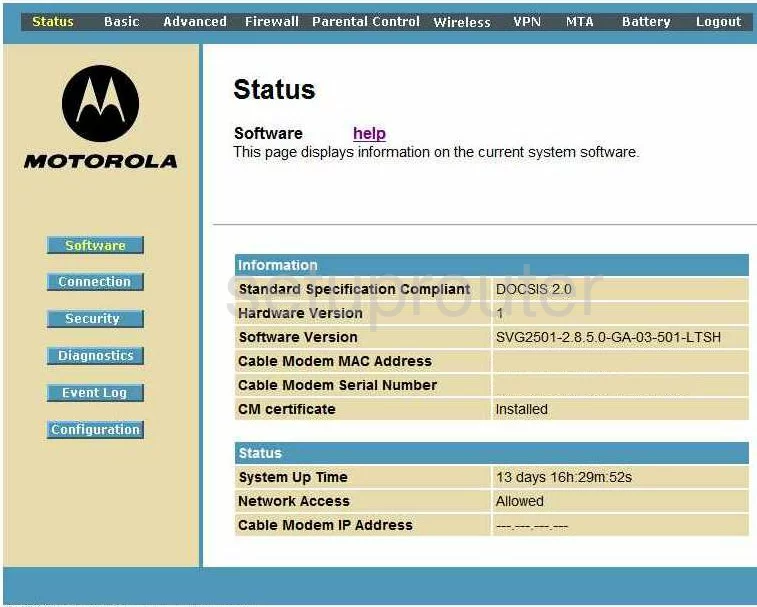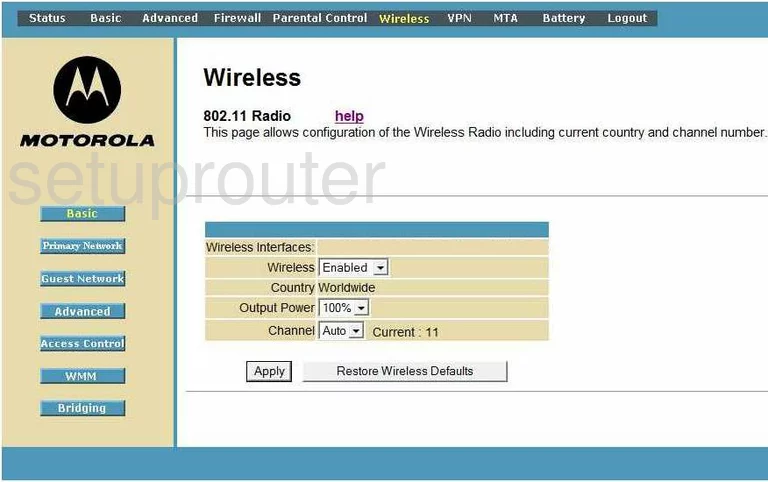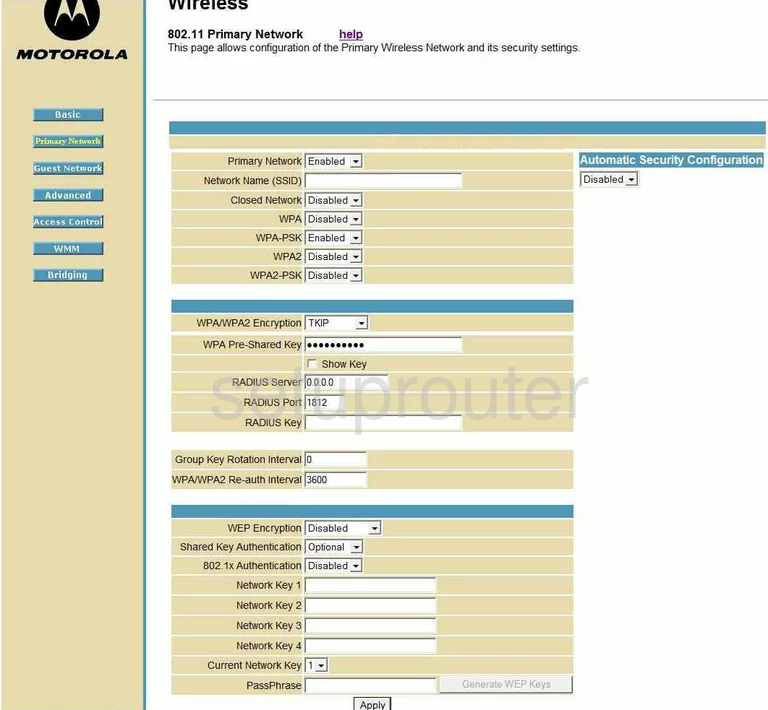The Motorola SVG2501 router is considered a wireless router because it offers WiFi connectivity. WiFi, or simply wireless, allows you to connect various devices to your router, such as wireless printers, smart televisions, and WiFi enabled smartphones.
Other Motorola SVG2501 Guides
This is the wifi guide for the Motorola SVG2501. We also have the following guides for the same router:
- Motorola SVG2501 - Reset the Motorola SVG2501
- Motorola SVG2501 - How to change the IP Address on a Motorola SVG2501 router
- Motorola SVG2501 - Motorola SVG2501 User Manual
- Motorola SVG2501 - Motorola SVG2501 Login Instructions
- Motorola SVG2501 - Information About the Motorola SVG2501 Router
- Motorola SVG2501 - Motorola SVG2501 Screenshots
WiFi Terms
Before we get started there is a little bit of background info that you should be familiar with.
Wireless Name
Your wireless network needs to have a name to uniquely identify it from other wireless networks. If you are not sure what this means we have a guide explaining what a wireless name is that you can read for more information.
Wireless Password
An important part of securing your wireless network is choosing a strong password.
Wireless Channel
Picking a WiFi channel is not always a simple task. Be sure to read about WiFi channels before making the choice.
Encryption
You should almost definitely pick WPA2 for your networks encryption. If you are unsure, be sure to read our WEP vs WPA guide first.
Login To The Motorola SVG2501
To get started configuring the Motorola SVG2501 WiFi settings you need to login to your router. If you are already logged in you can skip this step.
To login to the Motorola SVG2501, follow our Motorola SVG2501 Login Guide.
Find the WiFi Settings on the Motorola SVG2501
If you followed our login guide above then you should see this screen.

Beginning on the Status page of the Motorola SVG2501 router click the option near the top of the page labeled Wireless. This creates new options in the left sidebar. Be sure that the option of Basic is chosen.
Change the WiFi Settings on the Motorola SVG2501

On this page there is only one setting we are concerned about. Check the Channel and see if you are using 1,6, or 11. We recommend that everyone use these three channels. Click this link to learn more.
That's it for this page, before continuing click the Apply option near the bottom of the page.
Now look in the left sidebar and click the option of Primary Network.

This takes you to the page seen here. First, go ahead and Enable the Primary Network. This turns on your wireless network.
Secondly, you need to change the Network Name (SSID). This is a unique name you create in order to identify your local network. While it really doesn't matter what you enter here we recommend that you don't use personal information. Learn more about this topic in our Wireless Names Guide.
Next is the Closed Network. Leave this Disabled.
The following four drop-down lists are for your security. We highly recommend turning all of these off except WPA2-PSK. WPA2 is the strongest security mode for home networks. Learn more about this in our WEP vs. WPA guide.
Below that is the WPA/WPA2 Encryption. The most secure option is AES.
The last setting is titled WPA Pre-Shared Key. This is the password you use to allow access to your network. It is recommended that you use a minimum of 14-20 characters. Try and use some symbols, numbers, and capital letters in this password. We have more ideas on making stronger passwords in our Choosing a Strong Password Guide.
That's all that needs to be done, just click theApply button before you exit.
Possible Problems when Changing your WiFi Settings
After making these changes to your router you will almost definitely have to reconnect any previously connected devices. This is usually done at the device itself and not at your computer.
Other Motorola SVG2501 Info
Don't forget about our other Motorola SVG2501 info that you might be interested in.
This is the wifi guide for the Motorola SVG2501. We also have the following guides for the same router:
- Motorola SVG2501 - Reset the Motorola SVG2501
- Motorola SVG2501 - How to change the IP Address on a Motorola SVG2501 router
- Motorola SVG2501 - Motorola SVG2501 User Manual
- Motorola SVG2501 - Motorola SVG2501 Login Instructions
- Motorola SVG2501 - Information About the Motorola SVG2501 Router
- Motorola SVG2501 - Motorola SVG2501 Screenshots